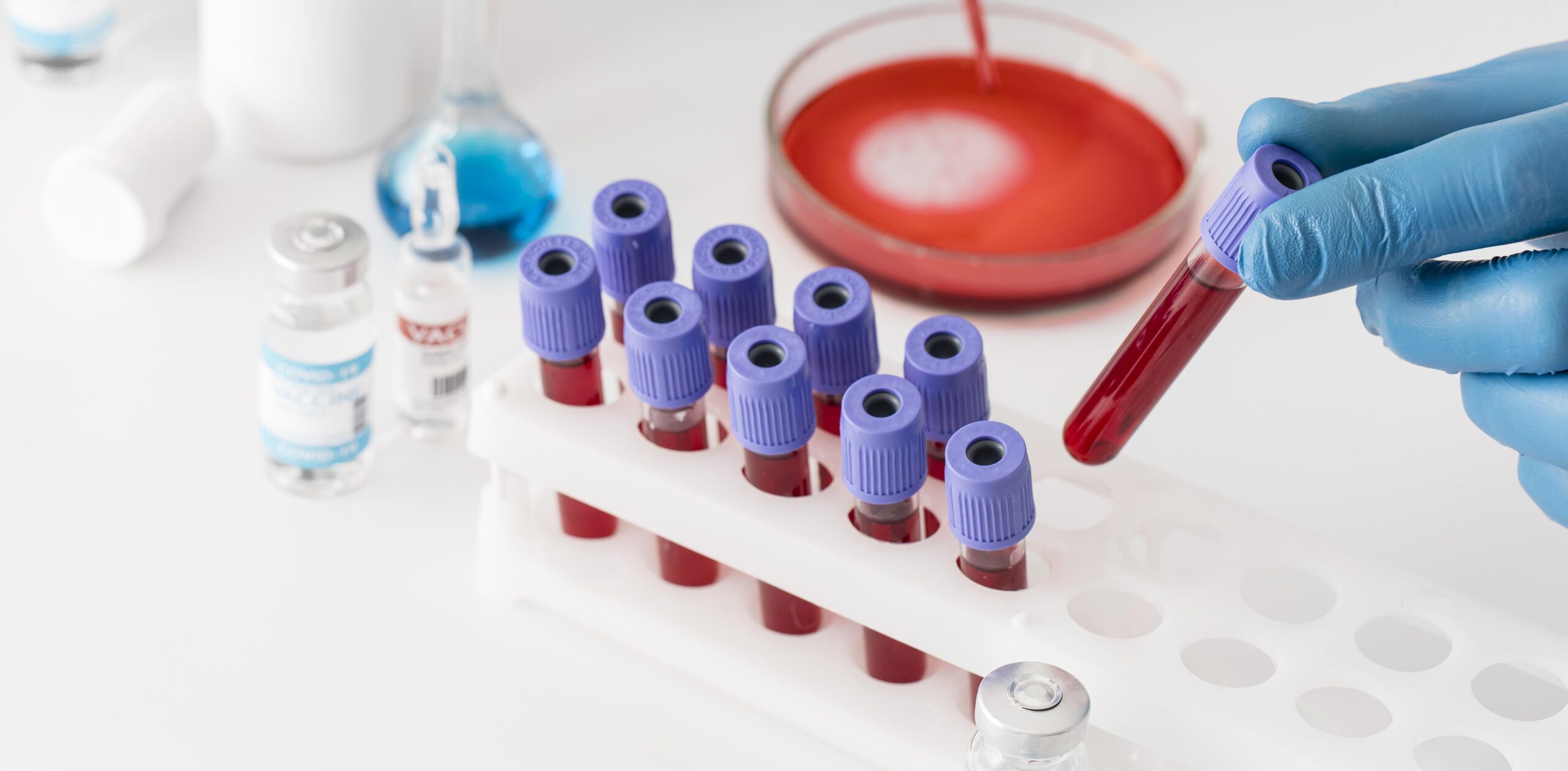Cortisol is an organic chemical compound popularly called the stress hormone. The adrenal glands produce this glucocorticosteroid and perform many significant functions in the human body. Abnormal cortisol concentrations can lead to the occurrence of numerous diseases.
The level of cortisol![]() in the body is not a constant value. First of all, it is related to the circadian rhythm. Patients often have increased cortisol in the morning, while in the evening, this hormone level is much lower, and the lowest cortisol level is usually at night – around midnight. Some factors can contribute to the increase in cortisol concentration in the blood. The secretion of more cortisol occurs as a result of stimulation of the sympathetic nervous system by stressors. When does the level of cortisol increase? The reason may be severe stress, tension, and long-term physical exercise. High cortisol may also result from an unhealthy lifestyle and can occur with a reduced diet.
in the body is not a constant value. First of all, it is related to the circadian rhythm. Patients often have increased cortisol in the morning, while in the evening, this hormone level is much lower, and the lowest cortisol level is usually at night – around midnight. Some factors can contribute to the increase in cortisol concentration in the blood. The secretion of more cortisol occurs as a result of stimulation of the sympathetic nervous system by stressors. When does the level of cortisol increase? The reason may be severe stress, tension, and long-term physical exercise. High cortisol may also result from an unhealthy lifestyle and can occur with a reduced diet.
Excess cortisol in the body may also be related to the pituitary gland's too-intensive secretion of ACTH. This problem is most often caused by a pituitary adenoma. It may also result from the presence of an adrenal tumor, and in addition, it sometimes appears as a result of long-term use of glucocorticosteroids.

Cortisol is a glucocorticoid hormone that the adrenal glands create and release. Glucocorticoids are steroid hormones that stop inflammation in every bodily tissue and manage metabolism in the muscles, fat, organs, and bones.
Almost every tissue in the organism has glucocorticoid receptors. That is why cortisol may impact nearly every organ system, including:
More precisely, cortisol influences the organism![]() in the following manners:
in the following manners:
Optimum cortisol levels are essential for life and keeping numerous bodily functions.
The cortisol level![]() in the blood, urine, and saliva typically peaks in the early morning and drops throughout the day, achieving its lowest level around midnight. This routine may be modified if you work a night shift and sleep at various periods of the day.
in the blood, urine, and saliva typically peaks in the early morning and drops throughout the day, achieving its lowest level around midnight. This routine may be modified if you work a night shift and sleep at various periods of the day.
Standard ranges can vary from lab to lab, time to time, and individual to individual.
Indications for testing a cortisol level include:
The blood sample![]() should be taken in the morning because the cortisol concentration is subject to a circadian cycle. It should also be taken when the patient is fasting. Because cortisol is a hormone released under the influence of stressful situations, its effect should be eliminated if possible or minimized as much as possible before collection to obtain a reliable result reflecting the patient's actual condition.
should be taken in the morning because the cortisol concentration is subject to a circadian cycle. It should also be taken when the patient is fasting. Because cortisol is a hormone released under the influence of stressful situations, its effect should be eliminated if possible or minimized as much as possible before collection to obtain a reliable result reflecting the patient's actual condition.
Intense physical activity should also be avoided beforehand. Your doctor may also recommend discontinuing medication or taking it only after your blood has been drawn if it could affect the reliability of your result in any way (e.g., anti-edematous drugs, drugs containing estrogen or androgens, synthetic glucocorticosteroids).
Your laboratory should provide the reference values for analyzing your results. Consult your doctor about this.

The norms![]() are significant information about possibly referring the patient for further diagnostics. A typical sample, taken in the morning hours, should give a result between 5 and 25 µg/dl. If the visit to the laboratory was slightly later, these values must be recorded between 4 and 20 µg/dl and at midnight from 0 to 5 µg/dl. Any observed deviations of cortisol from the norm, both lower and higher, require sending such a person for more detailed tests.
are significant information about possibly referring the patient for further diagnostics. A typical sample, taken in the morning hours, should give a result between 5 and 25 µg/dl. If the visit to the laboratory was slightly later, these values must be recorded between 4 and 20 µg/dl and at midnight from 0 to 5 µg/dl. Any observed deviations of cortisol from the norm, both lower and higher, require sending such a person for more detailed tests.
An elevated cortisol level![]() may indicate the presence of Cushing's disease, which is most often caused by the presence of ACTH-producing pituitary or adrenal tumors. An increase in cortisol levels is in patients with Cushing's syndrome. Cushing's syndrome is a group of symptoms resulting from an excess of steroid hormones – produced in excess by the adrenal glands and administered externally in the form of drugs or hormonal stimulation. An increase in cortisol levels may also be a symptom of cancerous lung tumors, anorexia, depression, increased exertion, and sudden or chronic stress.
may indicate the presence of Cushing's disease, which is most often caused by the presence of ACTH-producing pituitary or adrenal tumors. An increase in cortisol levels is in patients with Cushing's syndrome. Cushing's syndrome is a group of symptoms resulting from an excess of steroid hormones – produced in excess by the adrenal glands and administered externally in the form of drugs or hormonal stimulation. An increase in cortisol levels may also be a symptom of cancerous lung tumors, anorexia, depression, increased exertion, and sudden or chronic stress.
Usually, problems with cortisol are discussed in the context of hormone levels in the body being too high, but this is not the only possibility. People who have symptoms of low cortisol levels![]() should also be on their guard, as this may indicate, for example, Addison's disease associated with adrenal cortex disorders, specifically its hypothalamus. In the case of this disease, patients often experience chronic fatigue and an inability to exercise. Patients also lose their appetite and weight, and they also experience hypoglycemia and a drop in blood pressure. Addison's disease is most often autoimmune, but it can also be the result of cancer, tuberculosis, or congenital.
should also be on their guard, as this may indicate, for example, Addison's disease associated with adrenal cortex disorders, specifically its hypothalamus. In the case of this disease, patients often experience chronic fatigue and an inability to exercise. Patients also lose their appetite and weight, and they also experience hypoglycemia and a drop in blood pressure. Addison's disease is most often autoimmune, but it can also be the result of cancer, tuberculosis, or congenital.
Disorders related to insufficient secretion of ACTH or CRH, including hypothalamus or pituitary hypofunction, can also contribute to lower cortisol levels in the body. A diagnosed stress hormone deficiency is usually treated with glucocorticosteroids.
Therapies aimed at regulating hormones are often complicated, last for years, and require taking steroids![]() . Are there ways to effectively lower cortisol levels using home methods?
. Are there ways to effectively lower cortisol levels using home methods?
Start by taking care of your daily habits. The right amount of good-quality sleep will reduce cortisol. Adults should sleep 7 to 8 hours (children suitably longer, while the elderly should sleep less). Sleep in a dark room should be uninterrupted without a source of light and sounds, e.g., from the TV.
Problems such as sleep apnea, insomnia, or shift work (especially at night) effectively reduce the quality of rest. Research confirms that people who work shifts are more likely to struggle with overweight, heart disease, type 2 diabetes, and depression.
If you can:
The main assumptions of training in the gym are the desire to burn fat tissue and increase muscle tissue. Cortisol plays an important role in achieving both goals. During weight loss, it causes the release of fat from fat cells during periods of fasting, in the morning and during physical activity![]() . At this time, our body begins to draw energy from fat.
. At this time, our body begins to draw energy from fat.
Despite its demonization, cortisol also plays an important role. High concentrations of this hormone in the morning are important for waking up from sleep. Cortisol plays a key role in our body's energy production. Its low level impairs energy production and, as mentioned earlier, has a strong catabolic effect.
Cortisol increases protein synthesis, boosting energy and nutrients in the body. Its release during training allows for a hard workout as its concentration gradually increases.
Its short-term release is important, followed by its immediate decrease after the end of physical activity. Long-term elevation of cortisol causes protein breakdown, reduced cell insulin sensitivity, and increased fat storage.

Regarding what exercises for stress are best, a lot depends on our preferences and capabilities. When choosing a physical activity that is supposed to reduce stress levels, it is important to remember that these should be exercises that provide us with pleasure and joy. The point is that we do not force ourselves to do the exercises and that they do not involve direct competition – all this will not reduce, but on the contrary – will generate – the level of stress.
The selected physical activity should be adapted to our limitations and capabilities. For example, it is not worth attempting long-distance running if our fitness is low.
Currently, it is believed that aerobic exercises are one of the best in the context of reducing stress. They help with intensive but not exhausting training, and we can also do them outside, e.g., in an outdoor gym. Although we shouldn't set the bar too high, we should remember that stress exercises – regardless of their type – should have a certain intensity so that our heart rate is raised. The consequence of this state of affairs is an increase in the secretion of endorphins, which has a beneficial effect.
The intensity and pleasure of exercise and the regularity of their performance are significant in the context of the impact of physical activity on stress. That is why the chosen stress training should be attractive enough so that we do not have to motivate ourselves to continue doing it. It can be dancing, running, Nordic walking, yoga, pilates, swimming or cycling. A great option for outdoor activity that helps relieve stress is exercising in an outdoor gym, where we can do a fully effective and functional workout, including, for example, aerobic exercises.
Research confirms that the ability to recognize stressful thoughts allows one to implement mindfulness strategies. If you feel persistent and stressful thoughts swirling in your head, focus on them and accept them without judgment or guilt.
It is essential to recognize early symptoms of emerging stress, such as an increased heart rate or breathing rate. The sooner you relieve these signs, e.g., through breathing exercises or physical activity, the less your cortisol level will increase.
Family relationships can be a source of both severe stress and great joy. That is why it is worth consciously managing their dynamics to get the best out of them. The influence of family relationships on cortisol levels was studied based on hair length. It is involved in hair growth and is incorporated in small amounts. Therefore, by examining the content of this hormone in hair, it is possible to assess the concentration of the hormone in a given person at the time it was growing.
Support from a loved one![]() —both physical and verbal—that immediately precedes a stressful activity (e.g., a public appearance) reduces stress markers, including heart rate and blood pressure.
—both physical and verbal—that immediately precedes a stressful activity (e.g., a public appearance) reduces stress markers, including heart rate and blood pressure.
Blaming yourself, shame, not being good enough, and unresolved conflicts make us feel worse daily.
If you feel that your life is not going as you would like it to, try to determine the cause of this state of affairs and implement actions that are responsible for the change. Researchers believe that this will have a positive effect on your well-being.